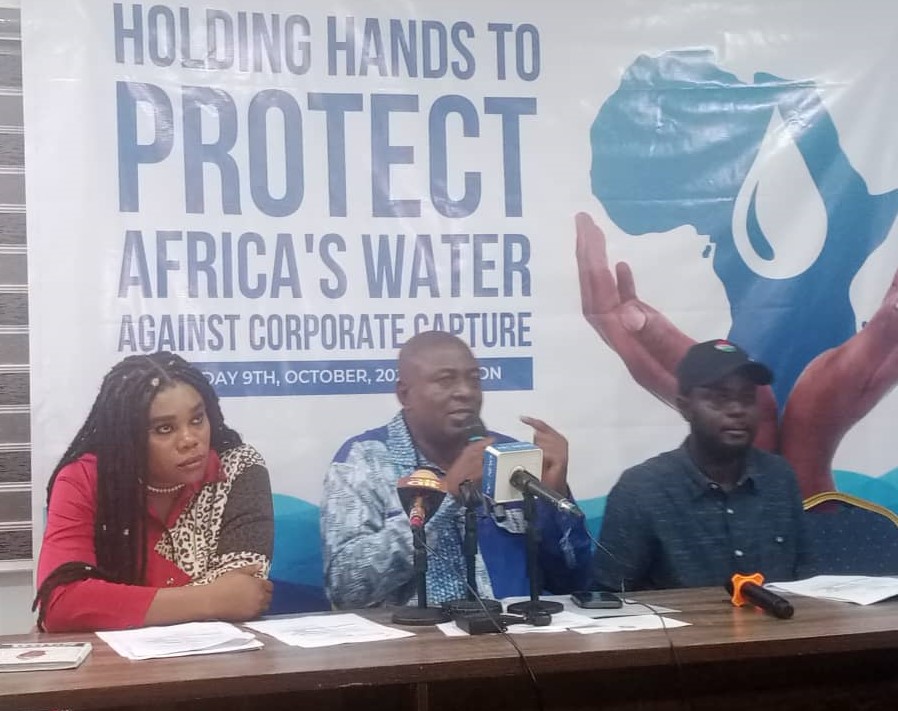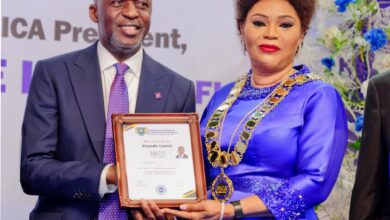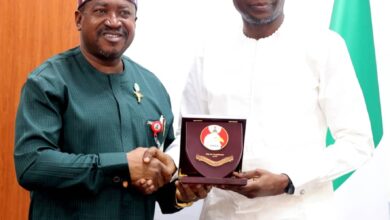Communities, CSOs, Workers Mobilise Against Water Privatisation Threats In Africa
...World Bank, IMF, multinationals indicted over sustained efforts to privatise water

By Edu Abade
Communities in Africa in collaboration with civil society groups, activists and workers have urged leaders and governments of the continent not to succumb to the pressure and threats of water privatisation in their various countries.
Speaking under the aegis of the Our Water, Our Right Africa Coalition (OWORAC), they maintained that privatisation of water under any guise remains a gross violation and in perpetual conflict with the fundamental human right to safe, potable and accessible water for all African peoples irrespective of class, gender and location.
The activists also indicted the Breton Wood institutions namely: The World Bank and International Monetary Fund (IMF), as well as multinational corporations of the Global North for the sustained efforts to privatise water in Africa due to the projected billions of dollars expected from successful investments on the essential commodity.
This was the verdict of the groups at a media briefing in Lagos on the sidelines of this year’s Africa Week of Action Against Water Privatisation through grassroots community engagement and stakeholder engagement with the theme: Holding Hands to Protect Africa’s Water From Corporate Capture.
Representatives of the Amalgamated Union of Public Corporations, Technical, Recreational and Employee Services (AUPCTRE), Corporate Accountability and Public Participation Africa (CAPPA), Public Services International (PSI), Africa Water Justice Network (AWJN) and Corporate Accountability, who spoke at the media briefing, stressed the need for all Africans to forge a common front to resist water privatisation on the continent.
Speaking at the forum moderated by Policy and Research Officer of CAPPA, Zikora Ibeh, Executive Director of CAPPA, Akinbode Oluwafemi, said: “Water is not a commodity to be traded, bartered or sold to the highest bidder. The rich countries of the Global North must stop pushing and funding neocolonial commodification practices in countries of the Global South, especially in Africa, disguised as benevolent development aids and interventions.
“The capitalist pillage of Africa’s waters, masquerading as innovative solutions, is a crime against the African people and is unacceptable.”
He explained that during the week of action, in which community leaders celebrate and work to protect the human right to water, those pushing dangerous privatization schemes will converge on the continent for the annual meetings of the World Bank and IMF in Marrakech, Morocco.
“The fact that the meetings are taking place in Africa for the first time in 50 years and despite the devastating earthquake in Morocco only two months prior indicates sharpened focus on shaping the future of Africa in the image of corporate control,” he said.
Speaking virtually, PSI’s Regional Secretary for Africa and Arab Countries, Sani Baba Mohammed, said: “Corporate greed has turned Africa’s water into blue gold mines, deepening inequalities and leaving communities parched, even when surrounded by an abundance that rightfully belongs to them.
“This is the shameful failure of market-centric water management approaches. Only community-driven solutions rooted in democratic decision-making and control of water resources for public good can guarantee water access, equality, accountability and security of jobs.”
Citing the failure of private water multinationals such as Veola and Suez, among others around the world and across Africa ranging from high water tariffs to labour abuses, he wondered why the World Bank, IMF and the United States Agency for International Development (USAID) continue to use their powers and influence to steer African governments towards water privatisation, which he described as ‘false solution.’
Also, the Sub-regional Secretary of PASI for English-speaking Africa, Everline Akech, pointed out that commodification of water in Africa will come at a huge price and that price will be paid by communities whose access to water will be severely restricted.
Akech added that women who will not be able to afford the huge costs will have to seek unwholesome alternatives, while children will suffer severe dehydration from unquenchable thirst.
Others who spoke at the meeting, including Fatou Diouf of PSI Senegal; Aderonke Ige of CAPPA; Abiodun Bakare of AUPCTRE; President of SYNATEC Trade Union of Cameroun, Chief Godson Ewoukem; Convener of Water Citizens Network, Ghana, Geoffrey Kabutey Ocaney; Sandra Ndang of the African Centre for Advocay, Cameroun and Director of Justica Ambiental, Mozambique, Anabela Lemos, among others, canvassed a stronger collaboration to stop water privatisation threats on the Africa continent.
On his part, Campaign Director, Corporate Accountability, Neil Gupta, who spoke on Unveiling the Global North Drivers of Water Privatisation, urged communities, individuals and groups to vehemently reject the threats to privatization of water in Africa.
“It is clear that governments of the Global North and the institutions they represent and control are inappropriately entangled with the private water industry.
“They have demonstrated that they cannot be trusted as ‘neutral advisors,’ as evidenced by the fact that they continue to dogmatically push water privatization on the Global South, despite overwhelming evidence of its failures.
“Therefore, building communities’ and workers’ power is the necessary counterweight to these corporate takeover schemes.











